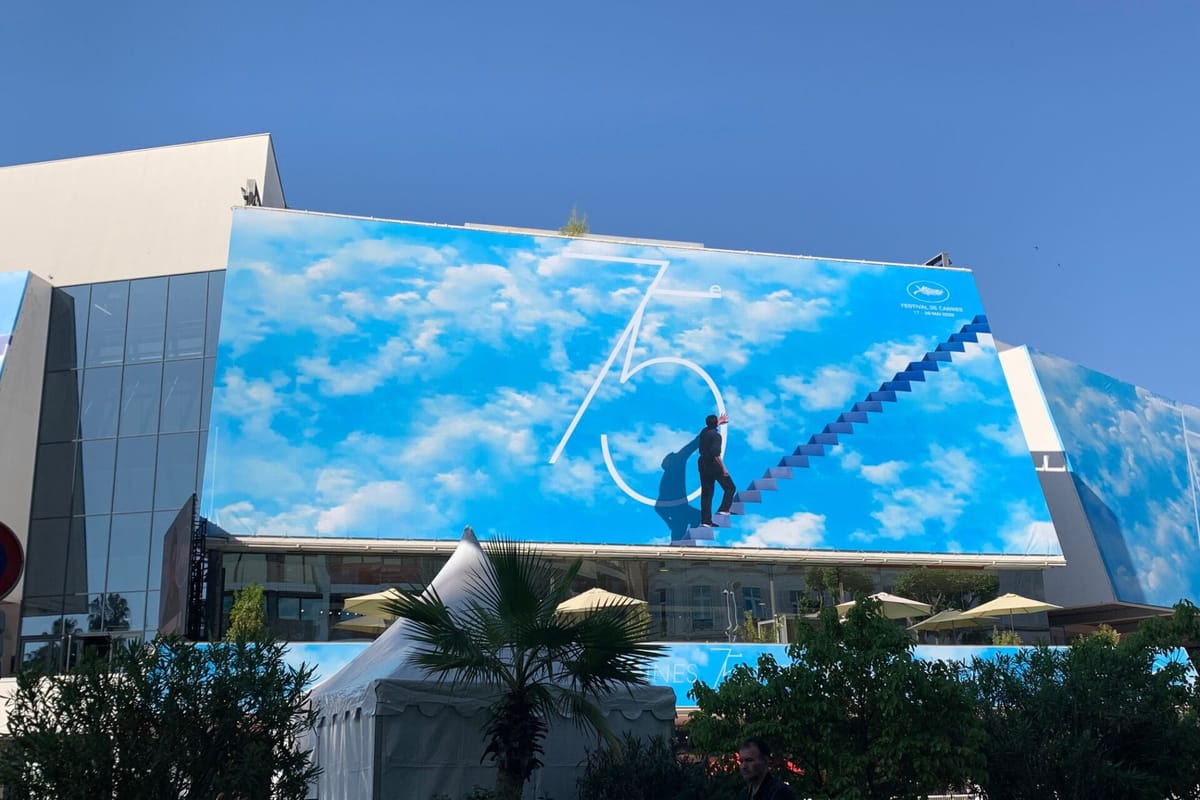So That Was Cannes 2022: A Return To The New Normal

A few friends will know that I left Cannes film festival early because my father, who had a long illness, reached the end of that journey and I went to sit with him and my mum for his final few days. While I’m obviously heartbroken, I’m also extremely thankful I was able to be with him, as I have friends who lost parents during the pandemic, but were not afforded that privilege.
At times like this, when we are also surrounded by pandemic, war, climate change and opportunistic politicians, it’s easy to ask myself why I write about something as trivial as the film and TV industries. But then I remember that human beings, everywhere in the world, seem to need this visual plane of the imagination on which we can project our hopes, dreams and fears. As Costa-Gavras said on a panel at this year’s Cannes: “Human beings cannot survive without stories; therefore cinema will continue. Not in the form we know it, but it will continue.”
With that in mind, I’ve summarised below some of the main points that stood out during Cannes from the perspective of the content industries based outside Europe and the Americas. This will be the last edition of Streamlined for a few months, but the intention is to gear up again in time for the autumn festival season. A huge thanks to my readers for your support and have a wonderful summer.
1. Theatrical sales are back, even if box office isn’t quite there yet
After a slow start, some big streamer acquisitions, including Netflix buying conspiracy thriller Pain Hustlers, directed by David Yates and starring Emily Blunt, for a reported $50m, and Apple swooping on Fingernails, starring Riz Ahmed and Jessie Buckley, began to heat up the market. However, the issues that theatrical buyers face – eye-watering prices and competition from the streamers – haven’t gone away, and box office in many territories is still recovering slowly.
Among titles from Asia and the Middle East, sales were particularly brisk on competition entries Broker, Japanese director Hirokazu Kore-eda’s first Korean film, and Park Chan-wook’s Decision To Leave, both of which Korea’s CJ ENM has been pre-selling for the past two years and have sold out in much of the world; as well as Ali Abbasi’s Iran-set noir Holy Spider, which also played in competition and sold widely through Wild Bunch; along with three Un Certain Regard titles – Davy Chou’s Return To Seoul, Chie Hayakawa’s Plan 75 and Maryam Touzani’s The Blue Caftan (see round-up of Cannes deals here).
What was encouraging is that it wasn’t just the streamers who were buying – these titles were racking up theatrical deals, including for North America, with Neon snapping up Broker, Sony Pictures Classics buying Return To Seoul for multiple territories, and Utopia springing for Holy Spider. MUBI was also an aggressive buyer during the market, taking Decision To Leave, Holy Spider and Return To Seoul for multiple territories (including North America for Decision To Leave) and planning theatrical outings before streaming on its own platform. It feels like there’s a move towards theatrical buyers acquiring multiple territories, perhaps to fend off the streamers, but in all cases, smaller buyers around the world seem to feel more comfortable when there’s a strong theatrical distributor in the US.
2. Global incentives race heats up as borders start to reopen
With the world opening up post-pandemic, the race is on to attract footloose productions to far-flung locations. Early in the market, Malaysia was talking up an increase to its 30% Film In Malaysia Incentive (FIMI), with an additional 5% rebate available for productions that promote Malaysian locations and cultural values and/or employ Malaysian key cast and crew. India also introduced its long-awaited incentive, announcing a 30% reimbursement scheme for international productions, capped at $260,000 (Rs20m), with a further 5% granted – up to $65,000 (Rs5m) – for employing 15% or more manpower in India. Australian film The Laugh Of Lakshmi, directed by S. Shakthidharan, will be one of the first productions to make use of the scheme.
Saudi Arabia also unveiled more details of its previously touted cash rebate of up to 40% on qualifying costs across features, documentaries and animation projects shooting in the kingdom. Managed by the Saudi Film Commission, the scheme is the most generous in the region, surpassing Abu Dhabi’s 35% rebate. Three international features have so far filmed in Saudi, including Desert Warrior, directed by Rupert Wyatt and produced by Stuart Ford’s AGC Studios, Jeremy Bolt’s JB Pictures and MBC Studios, which was shot at NEOM; Kandahar, starring Gerard Butler, which filmed in the AlUla region; and a small portion of Anthony and Joe Russo’s Cherry.
Outside of production incentives, the Film Development Council of the Philippines (which already operates a 20% production rebate) unveiled a scheme, entitled UniPhilippines, that provides international distributors with up to $8,000 for the promotion and marketing costs of releasing Philippines films. The scheme is selective in its disbursement and does not require recoupment.
3. Saudi Arabia stakes its claim to become a regional production hub
Out in force with its own pavilion in the International Village, Saudi Arabia had a lot to talk about in Cannes – the 40% cash rebate; NEOM, a futuristic megacity in the country’s northwest, that will house up to 20 sound stages; further studio plans for the AlUla region, which is also attracting shoots with its natural landscapes; and local productions such as Saudi-set coming-of-age drama Sea Of Sands, to be directed by Egypt’s A.B. Shawky (Yomeddine).
These ambitions follow the lifting of a 35-year cinema ban in 2017 and form part of Saudi’s ‘Vision 2030’ strategic framework to reduce its dependence on oil and diversify its economy. With a relatively young and affluent population of 30 million, Saudi has already become the region’s biggest box office territory, with receipts reaching $238m in 2021, and is likely to become the biggest content production and financing hub, outpacing Egypt, which has a larger population but less spending power. It’s estimated that Saudi box office will hit $1bn in the next few years, making it one of the biggest theatrical territories worldwide.
But what of the country’s human rights record and the assassination of journalist Jamal Khashoggi, which scuppered its international debut prior to the pandemic? The film industry has a short memory, especially where money is concerned, but I personally believe that engagement is better than boycotts. There’s the government, then there are 30 million Saudis, and that’s an awful lot of stories, opinions and cultural experiences that we can choose to either ignore or share. As far as I’m aware, no government has ever become more lenient because its cultural products were banned. On the other hand, as somebody who has covered China for many years, I’ve also seen that countries that open up to the world can just as quickly clam up again.
4. The China paradox: the lights were on but everyone’s locked up at home
And while we’re talking about China, it was strange to see that the country had two booths in Cannes – one in the Riviera and a pavilion in the Pantiero section of the International Village – that were both deathly quiet as only around 50 Chinese film professionals made it to the Croisette. Both pavilions were promoting Chinese films, such as sci-fi epic The Wandering Earth 2 and China-Italian co-production The Italian Recipe (which opens in China this weekend), but there were few boots on the ground due to on-going Covid lockdowns and a tightening censorship environment, which contributed to the lack of Chinese features in Cannes official selection.

The China pavilions in Cannes were mentioned in the country’s five-year film plan, released last November, which also talked about having a trade presence in Venice, Hong Kong and other major international festivals, despite the fact that Chinese filmmakers are finding it more difficult than ever to pass censorship and premiere at those festivals. The five-year plan also mentions expanding China’s international distribution networks and encourages Chinese companies to “explore the international market through investment, mergers and acquisitions, cooperations, and other means”.
And yet, this is a time of record low co-production and international cooperation for Chinese companies. Bridging The Dragon held its annual Sino-European forum during the Marche, in which speakers including Shanghai-based producer Natacha Devillers, Cedric Behrel of UK-based distributor Trinity Cine Asia and You Danxia, sales and acquisitions manager of Beijing HY Media, gave a frank overview of the activity that is still on-going. You Danxia said the number of flat fee imports in China reached a record high of 86 in 2019, grossing a combined $614m, but that number halved to 41 titles with $128m box office in 2020, the first year of the pandemic, and recovered only slightly to 48 and $157m in 2021.
So far this year, only 13 flat fee imports have been released in China, but with around half the country’s cinemas closed due to Covid lockdowns, they’ve only generated box office of $28m. Japanese romantic drama We Made A Beautiful Bouquet is the biggest flat fee hit so far in 2022.
5. Sub-Saharan Africa: time for more representation
Cannes festival director Thierry Fremaux was grilled on the lack of films from Sub-Saharan Africa in the official selection (one of many topics the press grilled him on) as Un Certain Regard opener Father & Soldier, a France-Senegal co-production directed by France’s Mathieu Vadepied (a white dude), was the sole title from the region. “It takes time for cinema to come into its own,” said Fremaux at a pre-festival press conference. “Prior to the political problems they encountered, there were other African countries that showed cinema is for them. It isn’t just one edition; it takes five years, it takes a decade.”
In the Marche du Film, the region was represented by the Pavillon Afriques in the International Village, which had delegations from nine countries in Sub-Saharan Africa, including Cameroon, Ghana, Malawi, South Africa and Uganda. Among the major international festivals, Berlin currently seems to be paying the most attention to the region, thanks to the pioneering work of curator Dorothee Wenner, but with investment starting to flow from the streamers, plans for new studios in Ghana and film schools springing up in various locations, it may not take a decade for more interesting cinema to emerge from this part of the world.
6. Korea continues to rise despite challenges at home
It appears there is no stopping South Korea on the international stage. Following the global success of Parasite, Minari, Squid Game, and not forgetting super-group BTS, Korean talents won two major awards in Cannes, with Park Chan-wook taking best director for Decision To Leave, and Song Kang-ho being awarded best actor for Broker. Both films were also sold to more than 100 territories each by Korean studio CJ ENM.

Korean content has undoubtedly benefited from government support policies, as well as savvy producers and strong studios like CJ, but the territory has had a rough time during the pandemic. As cinema admissions collapsed during various waves of Covid, distributors held back local releases and it’s estimated that there’s a backlog of around 100 local titles awaiting release. According to a Variety report, Korean films grossed just $138m last year, compared to $776m in the pre-pandemic year of 2019.
There’s also a feeling in some quarters of the industry that strong studios are a double-edged sword, because while they have the resources to finance and promote films like Parasite and Broker internationally, their close to monopoly position in the domestic market makes it difficult for new talent and smaller companies to break through.
But that’s a problem that many filmmaking nations would love to have, as they lack significant resources on either a private or government level. Meanwhile, the Korean government’s film policies are inspiring several other Asian film agencies, including those in Singapore, Taiwan and the Philippines, as they develop their own support strategies. There are also signs that Korea’s box office is finally starting to recover.
Local action drama The Roundup, starring Don Lee (Train To Busan), released on May 18, has a cumulative gross of $58m after two weeks on release, which makes it the biggest film of the year ahead of Doctor Strange In The Multiverse of Madness on $49.7m. This should hopefully give other distributors the confidence to start pushing out big releases. Broker and Decision To Leave are both scheduled for local release in June.




